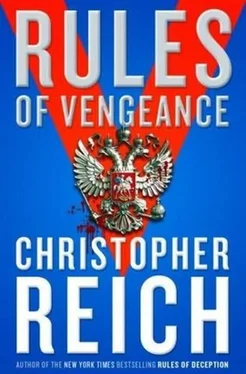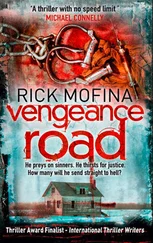“Have a look,” said McKenzie. “I found a piece of something fused to the underside of the asphalt. I’ve got it up on the screen.”
Baxter hopped into the crater and knelt by the Microviper.
“It’s a circuit board,” said McKenzie, pointing to the jagged piece of sky-blue plastic filling the screen. “Part of the phone used to detonate the bomb. I found other pieces here and there. I scanned them all and rearranged them so they fit together. Mind you, some pieces are still missing, but I think we’re getting somewhere.”
“Are those the serial numbers?”
“Four-five-seven-one-three,” said McKenzie. “We’re missing a few at the beginning. That piece must have been obliterated. Sorry ’bout that.”
“Got a maker?”
“Not yet. We need to send it to the lab. They can run it against their samples for similarities.”
To each phone a circuit board, and to each circuit board a serial number. Further study of the circuit board’s architecture would pinpoint the manufacturer. From there, it was a matter of tracking down where all phones carrying circuit boards with the last five digits 45713 had been distributed. The goal was to ascertain where the phone had been sold, the SIM card or phone number assigned to it, and, if you were lucky, the name of the villain who’d purchased it. It was no different from following a wounded animal back to its lair, thought Baxter.
“I want you to deliver all the pieces you’ve tagged and bagged to the lab,” he said. “Stay on them until they come up with something, then call me. Doesn’t matter what time.”
Baxter stomped off toward the mobile HQ. For the first time in twenty-four hours, he had a smile on his face. It was an ugly, pained smile, but nonetheless, it counted.
Den Baxter had the scent of his prey.
It was only a matter of time until he found them.
The truck had come to a halt . Jonathan lay still, listening to the hiss of air escaping the brakes and the low-throated rumble as the engine quit and died. The window was open and Jonathan could hear the growl of cars and trucks arriving and departing around them. He waited for the driver to climb from the cabin, but the man remained stubbornly at the wheel, arguing with his dispatcher over a change in his routing. To Hamburg now, farther north than Berlin.
Jonathan edged the blanket from his face. Blinking back the light, he raised his head in order to catch a glimpse of the outside world. He needed to situate himself on a map. They’d been driving for over two hours at what felt like a rapid speed, and he estimated that they’d traveled 200 kilometers at the very least. From his position behind the driver’s seat, he spied the corner of a Shell Oil placard, and beyond it a highway sign offering the distance to Brussels as 16 kilometers. Aachen, in Germany, was another 74, and Cologne, 201. The distances reinforced his impatience. All were too far in the wrong direction. With a full tank, the driver could make it another 600 or 700 kilometers before having to refuel.
Jonathan’s hands twitched with the need to move, yet he forced himself to remain still. He couldn’t afford a confrontation with the driver. Not here, where a dispute would be witnessed by dozens and the likelihood of a policeman’s being nearby was high. He would have to keep hidden longer.
Just then the driver ended his call. But instead of climbing down from the cabin, he turned in his seat and lunged toward the bunk. Jonathan yanked the blanket over his head and held his breath as forceful hands searched among the books, magazines, and papers littering the bed. Finally there came a grunt of satisfaction as the driver found what he was looking for: a logbook barely an inch from Jonathan’s head.
The driver’s door opened and he descended from the cab. Jonathan threw off the blanket and sat up. Gasping, he crawled across the bunk to the passenger door. In the side mirror, he watched the driver unscrew the gas cap, insert the fuel nozzle, then move to the rear of the truck, where he knelt to check the tires’ pressure.
This was the time.
Jonathan moved into the front seat, and opened the passenger door and jumped to the ground. Parked adjacent to him, no more than 2 meters away, was a Peugeot sedan painted with the orange-and-blue insignia of the Belgian police. An officer sat at the wheel. Another uniform was standing nearby, pumping gas and blocking passage toward the front of the truck. Jonathan hesitated, his hand still on the door, then walked in the opposite direction. A moment later the driver rounded the rear of the truck, effectively boxing him in. He looked at Jonathan and said loudly in Italian, “Hey, what are you doing?”
Jonathan approached, smiling. He was aware of the policemen’s gaze and knew that he held their undivided attention. The driver was a grizzled man, fifty or more, and in bad humor after the drawn-out arguments with his wife and his boss. Jonathan thought of the academic tomes, the newspapers. The driver was an intelligent man, to be sure. Only the truth would do.
“I hitched a ride in your truck from England,” he answered, his Italian fluent, if workmanlike. “I apologize. I should have asked, but I was afraid you would say no, and I couldn’t take that chance. I’m broke and I’m trying to get to Rome to see my girlfriend. I saw your plates, so I took a chance.”
“I’m going to Hamburg.”
“Yeah, I heard. That’s why I thought I’d get out here.” Jonathan let his eyes gesture at the police. “Prego, signor.”
“Where are you from?” the Italian asked in a quieter voice.
It was the defining question. Funny that a man effectively without a country should have to answer it. “America.”
Out of the corner of his eye, Jonathan saw a policeman approach. “Ça va, monsieur?” he asked the driver.
The driver sniffed, his eyes never leaving Jonathan’s. “Tout va bien,” he responded finally.
“Vous êtes certain?”
“Oui.” The driver knelt and unscrewed the tire pressure gauge. As Jonathan passed, he glanced up. “Your Italian’s not bad for an American,” he said in English. “Now get lost.”
“Thanks.”
Jonathan continued toward the kiosk. With each step he expected the police to call out. They would ask to see his identification papers and discover that he had no passport. They would take his driver’s license instead, and ask him to sit inside the police car while they checked him out. That would be that.
But the policemen said nothing. Jonathan was still a free man. For the time being.
Inside the kiosk , Jonathan purchased a razor and shaving cream, two oranges, a salami sandwich, mineral water, a toothbrush and toothpaste. The kiosk was part of a larger shopping gallery that spanned the highway. There was a Mövenpick restaurant and a clothing store, some tourist shops, an electronics shop, and several tobacco vendors. He passed from one to the next, purchasing a new pair of pants, a button-down shirt, a windbreaker, and a baseball cap. There was a single-user bathroom. It took him ten minutes to cut his hair and shave it down to a stubble. At last the gray was gone. He applied a self-tanner to his face, careful to blend it naturally with the lighter flesh tones of his neck and chest. Finished, he found a pay phone and called for a taxi.
Fifteen hours had passed since his escape from Graves. He had no doubt that his name already figured high on every fugitive watch list across Europe. But he knew enough about law enforcement, and more about governments and bureaucracies, not to be overly concerned. It would take awhile for his information to be forwarded to hotels, car rental companies, airlines, and the like. At some point Graves would see to it that his credit cards were frozen, too, but all that was in the future.
Читать дальше












